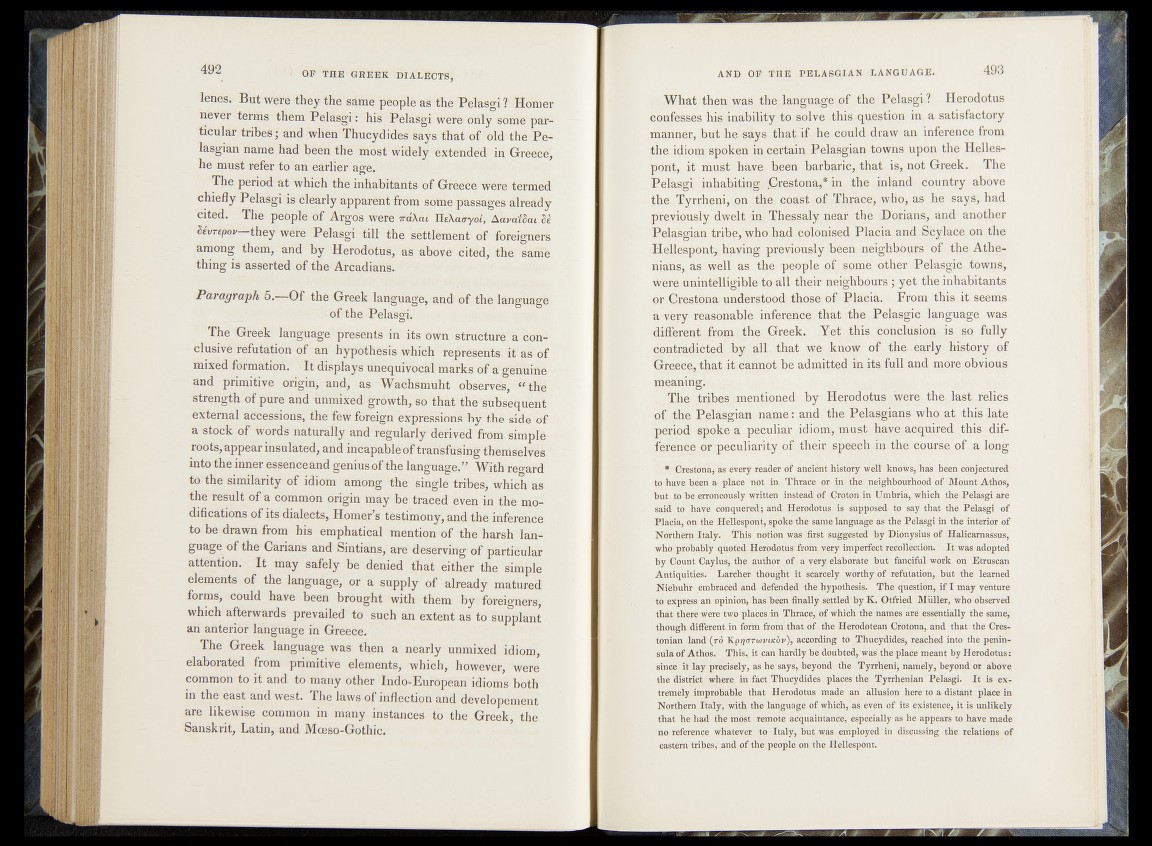
lenes. But were they the same people as the Pelasgi? Homer
never terms them Pelasgi: his Pelasgi were only some particular
tribes; and when Thucydides says that of old the Pe-
lasgian name had been the inost widely extended in Greece,
he must refer to an earlier age.
The period at which the inhabitants of Greece were termed
chiefly Pelasgi is clearly apparent from some passages already
cited. The people of Argos Were irdXcu HeXcioyoi, ActvaiSai êè
èévrepov^they were Pelasgi till the settlement of foreigners
among them, and by Herodotus, as above cited, the same
thing ie asserted of the Arcadians.
Paragraph 5.—Of the Greek language, and of the language
of the Pelasgi.
The Greek language presents in its own structure a conclusive
refutation of an hypothesis which represents it as of
mixed formation. It displays unequivocal, marks of a genuine
and primitive origin, and, as Waehsmuht observes, « th e
strength of pure and unmixed growth, so that the subsequent
external accessions, the few foreign expressions by the side of
a stock of words naturally and regularly derived from simple
roots, appear insulated, and incapabléof transfusing tftêm#ël¥ës
into the inner essence and genius of the language.’’ With regard
to the similarity of idiom among the single tribes, which as
the result of a common origin may be traced even in the modifications
of its dialects, Homer’s testimony, and the inference
to be drawn from his emphatical mention of the harsh lan-
guage of the Carians and Sintians, are deserving of particular
attention. I t may safely be denied that either the simple
elements of the language, or a supply of already matured
forms, could have been brought with them by foreigners,
which afterwards prevailed to such an extent as to supplant
an anterior language in Greece.
The Greek language was then a nearly unmixed idiom,
elaborated from primitive elements, which, however, were
common to it and to many other Indo-European idioms both
in the east and west. The laws of inflection and developement
are likewise common in many instances to the Greek, the
Sanskrit, Latin, and Moeso-Gothic.
What then, was the language of the Pelasgi ? Herodotus
confesses his-inability to tsplve this,question in a satisfactory
manner, but-he says that if he could draw an inference from
the idiom spoken incertain Pelasgi an towns upon the Hellespont,
it must,l'p;ave been barbaric, that is, not Greek. The
Pelasgi. inhabiting)|>eston%j* in the inland country above
the^Tyrrheni,jgn .the coast^a£.Thrace, who, as he says, had
previously dw§|t in ThessaJ^J^ih 'the Dorians, and another
Pelasgian tribe, w hohad colonised Placia and Scyl^ce on the
Hellespont, having, preyioùsly'&eg neighbours of , the Athenians,
as well as the ipehp^pf'some other Belasgic-towns,
vtfére unintelligible to all their neighbours';-yet'the inhabitants
or Crestona understood those of;-Placia. From this it seems
a very, reasonable inferences that the Pelasgi;© language was
different from,the Greek. JYet thisIc&nclusion is^so fully
cpntradicted by all that we -know* o^iMe- early history of
Greecïç that it cannot be admijîtèct|x|ts full and more obvious
meaninMfe;;
The tribes mentioned^by? Herodptus ^were^thev last relics
of the Peldsgian name : and the Peja'sgians who at this late
period spoke a peculiar idiom,, must ]|aye|acq,uifod this dif-
fepnoe ori peculiarity^» theiy speech in the^ course pf; a long
* Crestona, as e fe y reader of aficient hjstorÿ well knows, has been conjectured
to have, been a- place nothin Thrace or in the.? neighbourhood of Mount Athos,
but to be erroneously written instead; of ,€ro tonin Igfiibria, which the Pelasgi are
said to have conquered; and Herodotus’ is supposed . to say that,the'Pelasgi of
Placia, on the Hellespont, spoke the same language as the Pelasgi in the interior of
Northern Italy. This notion was first- suggested by Dionysius of Halicarnassus,
who probably quoted Herodotus from very imperféctieëpllectioii.* I t was adopted
by Count Cay lus, the author of, a very, elaborate but fanciful work on Etruscan
Antiquities. Larcher thought it, scarcely worthy of refutation, Shut the learned
Kiebuhr embraced and defended the hypothesis.' The question, if I may venture
to express an opinion, has been finally settled by K. Otfried Miiller, who observed
that there were two places in Thrace, of which the names are essentially the same,
though different in form f^om that of the Herodotean Crdtona, and that the Cres-
tonian land (to Kpjjorwvucov), according to Thucydides, reached into,the peninsula
of Athos. This, it can hardly be doubted, was the plaCe meant by Herodotus:
since it lay precisely, as he says, beyond the Tyrrheni, namely, beyond or above
the district where in fact Thucydides places the Tyrrhenian Pelasgi. I t is extremely
improbable that Herodotus made an allusion here to a distant-place in
Northern Italy, with the language of which, as evetf of its existence, it. is unlikely
that he had the Molt remote acquaintance, especially as he appears to have made
no reference whatever foitïtalÿ, bul^wàs endployed "in discussing. the relations of
eastern tribes, .and of the people on the Hellesponttpt*